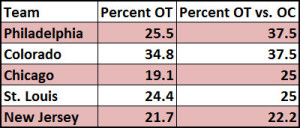WASHINGTON — With the NHL on its All-Star break and hitting the second half of the season Tuesday, three teams are within four points of the eighth and final playoff spot in the Western Conference. While the East looks more clear-cut, the postseason push provides an opportunity to address a mathematical quirk in the game, one that could potentially lead to problems in the future if it is not addressed.
In a recent blog post, professional poker player and noted hockey fan Daniel Negreanu mused about the state of the game. While much of his focus was on the uneven divisions in today’s NHL and possible expansion cities, he brought up another interesting point — the game, as currently constructed, leaves itself open to potential collusion.
Unlike every other major American sport, hockey’s win, loss and tie outcomes do not come with a static value. Any game that ends in regulation awards a total of two points (both to the winner), but any contest that reaches overtime awards three — two to the winner, one to the loser. Considering that there is a fluctuating number of points available to be won, matchups against teams in the opposite conference would benefit both sides’ playoff chances, or positioning, if they went to overtime.
Consider an example: The Philadelphia Flyers play the Anaheim Ducks twice this season. Both games go into overtime, guaranteeing each club a point apiece from each. No matter who takes the extra point for the eventual victory, both walk away with no fewer than two points.
As it turns out, that’s exactly what happened in this year’s Philly-Anaheim series (the Ducks won both games in shootouts). If other teams — say, the Caps — lose both games to the Ducks in regulation, they could lose out on two potentially valuable points, simply due to the nature of their losses.

Now, let’s be very clear: There is absolutely no hard evidence that any actual collusion has taken place this year. If anything, a comprehensive study of the entire league shows the opposite trend, as 23 of the 28 teams have played a higher percentage of their overtime games against foes within their conference. Of the five outliers, two basically break even on the statistical differences, two are slightly more pronounced, and only one really stands out, in what is admittedly a tiny sample size. That one is the Flyers, which is why we’ve picked on them for this example.
It is also important to note that while the Ducks are steamrolling, holding down the top point total out West, the Flyers are a full 12 points shy of the eighth and final playoff spot right now. A point here or there isn’t going to get them to the postseason this year. Besides, Philadelphia has only gone to overtime with the same Western Conference foe more than once, in the case of the Ducks.
Interestingly, the Flyers also played a higher percentage of overtime games against the Western Conference last year as well (7 of 28, versus 10 of 54 against the East), but played in the standard 60 minutes in both games against Anaheim. Their seven overtime/shootout games against Western Conference opponents last year came against six different squads, with Nashville the only repeat offender. All this goes to say that while the Flyers have been, for whatever reason, slightly more prone to playing overtime games against the opposite conference, there doesn’t appear to be any rhyme or reason to common opponents when these instances occur.
But that doesn’t mean such a possibility shouldn’t be a concern for the NHL moving forward. While teams tend to finish with a slate of games within the division or conference, there are still plenty of late season inter-conference matchups for every team. Considering just six points separated the fifth seed from the ninth seed in the East last year (and just three points between the eighth and tenth seeds out West), there is plenty to be gained or lost by gaming the loophole in the current system.
Follow @WTOP and @WTOPSports on Twitter and WTOP on Facebook.





